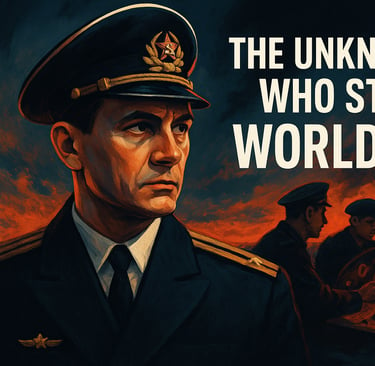The Unknown Man Who Stopped World War 3
One voice of reason. One act of defiance. One moment that saved humanity.
MILITARY TECHPATRIOTISM
Sahil Sharma
5/22/20252 min read


The oceans boiled.
The sky trembled.
And deep beneath the surface of the Atlantic, in a Soviet submarine surrounded by enemy destroyers, three men argued over the end of the world.
Two said yes.
One said no.
That no might be the only reason you’re alive today.
This is the true story of Vasili Arkhipov—the man who stopped World War 3 and was nearly forgotten by history.
The Most Dangerous Day in Human History
October 27, 1962.
A date etched in silence, never marked in history books with red ink. But it should have been.
The Cuban Missile Crisis had brought the world to the brink.
For 13 tense days, the United States and the Soviet Union stared each other down—nuclear warheads loaded, bombers in the air, fingers on the trigger.
That day, a Soviet nuclear-armed submarine—B-59—was lurking in international waters, just off the coast of Cuba. It had been cut off from Moscow for days. American destroyers were dropping depth charges, trying to force it to surface.
Inside the sweltering sub, the crew thought war had already begun.
They believed they were under attack.
The Decision: Launch or Die
The submarine had a terrifying ace up its sleeve: a nuclear torpedo with the explosive power of Hiroshima.
Protocol required three officers to unanimously agree to launch it.
Two were ready.
Captain Valentin Savitsky wanted retaliation.
Political Officer Ivan Maslennikov gave his approval.
That left just one man: Vasili Arkhipov, the second-in-command.
The final vote.
Had he said yes, B-59 would have launched its nuclear payload at the U.S. Navy fleet. The Americans would have responded instantly. Within minutes, the entire world could have been engulfed in fire.
Cities would’ve vanished.
Hundreds of millions would’ve died.
And you wouldn’t be reading this.
The Man Who Said No
But Vasili Arkhipov refused.
He argued with the captain. He resisted the pressure.
Even in the stifling heat, with no communication from command, and the deafening sound of depth charges above, he chose restraint over revenge.
Eventually, he convinced Savitsky to surface the submarine instead of launching the torpedo.
In that moment—buried beneath the sea—a single decision altered the fate of the planet.
Why No One Knew
For decades, this event was buried in classified Soviet files.
The world didn’t know it had come within a heartbeat of nuclear annihilation.
Even after the Cold War, Arkhipov’s name remained in the shadows.
No medals.
No press.
No recognition.
But history has a way of finding its heroes.
Why Arkhipov’s Story Matters Today
In a world armed with even more nuclear weapons…
In an era of rising tensions, miscommunications, and AI-driven conflict…
We’re still one bad decision away from catastrophe.
And it reminds us:
It doesn’t take a general, a president, or a nation to change the course of history.
Sometimes, it just takes one man—calm in chaos—who dares to say “no.”
Conclusion
Vasili Arkhipov didn’t fire a shot.
He didn’t lead an army.
He didn’t seek glory.
But on that fateful day in 1962, when the world sat on a knife’s edge…
He may have saved it.
Let us remember his name—not just as a Cold War figure, but as a symbol of reason, restraint, and the staggering power of a single human choice.
